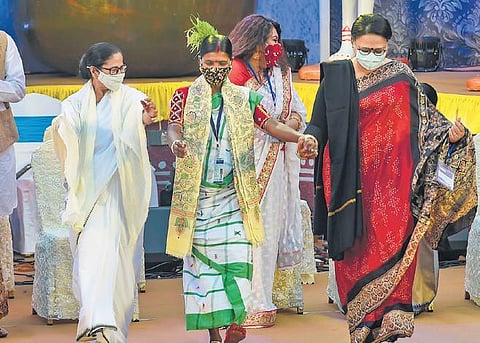

KOLKATA: Notwithstanding the surge in COVID-19 cases and a super cyclone that left a trail of destruction in its wake, West Bengal's political cauldron was on the boil through 2020, with the ruling TMC and BJP crossing swords at the drop of a hat, stoking tension and triggering clashes.
Flashpoints in West Bengal politics were one too many, as the state hogged national limelight for all the wrong reasons and witnessed widespread political violence, as the parties geared up for a high-octane assembly election next year.
The BJP has claimed that more than 130 of its cadres were killed or found dead under mysterious circumstances, since the 2019 Lok Sabha polls.
The TMC government routinely sparred with the BJP-led Centre during the year, and the slugfest spared practically no one, including the saffron party's president J P Nadda, whose convoy came under attack earlier in December during his visit to Diamond Harbour in South 24 Parganas.
The Home Ministry summoned three IPS officers to serve at the Centre on deputation over alleged lapses which led to the attack on Nadda, leaving Chief Minister Mamata Banerjee fuming.
Several BJP leaders sustained injuries in the attack.
Union Home Minister Amit Shah and the BJP went hammer and tongs against the state government over the "worsening" law and order situation, and the saffron party shifted a battery of its central leaders to the eastern state with an eye on the assembly polls.
Shah announced an ambitious target of winning more than 200 of the state's 294 assembly seats, an assertion which drew a sharp retort from the TMC's adviser and poll strategist Prashant Kishor, who said the BJP will struggle to cross double digits.
Pushed to the wall by the aggressive Hindutva campaign by the BJP, Banerjee and her TMC invoked 'Bengali pride' to consolidate its support base.
The BJP, in its bid to blunt the TMC's election weapon of sub-nationalism, took to eulogising Bengali icons such as Nobel laureate Rabindranath Tagore, Swami Vivekananda and Ishwar Chandra Vidyasagar.
The ruling party, for the first time since it came to power in 2011, witnessed a rebellion this year as several MLAs and an MP, including party heavyweight and minister Suvendu Adhikari crossed over to the BJP.
The TMC, however, put up a brave face and said it was finally free of "traitors".
The Left Front and the Congress, which have been victims of the TMC's defection politics in the past, said the ruling party is getting a dose of its own medicine.
The year began with massive protests sweeping the state over the Citizenship Amendment Act, and the issue is expected to haunt the saffron camp in 2021 assembly polls.
The BJP is apprehensive that the delay in implementing the CAA due to agitations by its rivals may turn refugee voters, especially those from the Matua community, against it.
Meanwhile, North Bengal, where the BJP made deep roads, bagging seven of the eight Lok Sabha seats in 2019, witnessed a political churning as the GJM faction led by fugitive Gurkha leader Bimal Gurung quit the BJP-led NDA and joined hands with the TMC.
Gurung, who was in hiding for three years, returned to Darjeeling and vowed to teach the BJP a lesson by ensuring TMC's victory in North Bengal, where he wields influence over at least 20 assembly seats.
Bengal received major flak from various quarters during the year for the way it handled the COVID-19 pandemic, as the state accounted for around 19 per cent of the total cases in the country, and 15 per cent of overall fatalities.
The arrival of Inter-Ministerial Central Teams (ICMTs) to assess the COVID situation led to a war of words between the state and the Centre, with the Union government asking the TMC dispensation to pull up its socks and bolster its healthcare infrastructure.
Bengal also faced a massive migrant crisis triggered by the pandemic-induced nationwide lockdown that rendered millions jobless, forcing them to undertake arduous journeys to their native villages, hundreds of miles away from their places of work.
Banerjee, who is also the TMC supremo, was at the forefront in slamming the central government for the "unplanned" lockdown and the subsequent migrant labour crisis, which sparked one of the biggest migrations since Partition.
Amid the political tug of war, the relationship between the state government and the Raj Bhavan hit a new low this year, after the ruling TMC accused Governor Jadgeep Dhankhar of running a "parallel government" at the behest of the BJP.
Concerns over security were raised after several Al- Qaeda operatives were arrested by the National Investigation Agency (NIA) from Murshidabad district in September.
Opposition parties claimed "intelligence failure and appeasement politics" of the Mamata Banerjee had left the state vulnerable to terrorist activities.
The TMC rubbished the allegation and said its rivals were politicising an issue involving national security.
The COVID-19 pandemic apart, Cyclone Amphan brought Bengal to its knees in 2020, as the natural calamity claimed around 100 lives, left hundreds of people homeless and caused extensive damage to infrastructure.
Coronavirus restrictions hindered relief work, stoking public anger.
With less than six months left for the assembly polls, the Mamata Banerjee government launched a massive public outreach in December to ensure the benefits of its 11 flagship welfare programmes reached every household.
Christened "Duare Sarkar" (government at doorsteps), the programme covers 11 sectors including employment generation, health, women's empowerment, community development and girl education, among others.